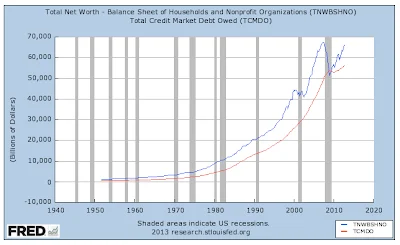Among other farcical things.
[I]n late 2008 the Federal Reserve initiated a series of large-scale asset purchases (LSAPs). In November, the FOMC announced a program to purchase a total of $600 billion in agency MBS and agency debt. In March 2009, the FOMC expanded this purchase program substantially, announcing that it would purchase up to $1.25 trillion of agency MBS, up to $200 billion of agency debt, and up to $300 billion of longer-term Treasury debt. These purchases were completed, with minor adjustments, in early 2010. In November 2010, the FOMC announced that it would further expand the Federal Reserve's security holdings by purchasing an additional $600 billion of longer-term Treasury securities over a period ending in mid-2011.
About a year ago, the FOMC introduced a variation on its earlier purchase programs, known as the maturity extension program (MEP), under which the Federal Reserve would purchase $400 billion of long-term Treasury securities and sell an equivalent amount of shorter-term Treasury securities over the period ending in June 2012. The FOMC subsequently extended the MEP through the end of this year. By reducing the average maturity of the securities held by the public, the MEP puts additional downward pressure on longer-term interest rates and further eases overall financial conditions.
How effective are balance sheet policies? After nearly four years of experience with large-scale asset purchases, a substantial body of empirical work on their effects has emerged. Generally, this research finds that the Federal Reserve's large-scale purchases have significantly lowered long-term Treasury yields. For example, studies have found that the $1.7 trillion in purchases of Treasury and agency securities under the first LSAP program reduced the yield on 10-year Treasury securities by between 40 and 110 basis points. The $600 billion in Treasury purchases under the second LSAP program has been credited with lowering 10-year yields by an additional 15 to 45 basis points. Three studies considering the cumulative influence of all the Federal Reserve's asset purchases, including those made under the MEP, found total effects between 80 and 120 basis points on the 10-year Treasury yield. These effects are economically meaningful.
Importantly, the effects of LSAPs do not appear to be confined to longer-term Treasury yields. Notably, LSAPs have been found to be associated with significant declines in the yields on both corporate bonds and MBS. The first purchase program, in particular, has been linked to substantial reductions in MBS yields and retail mortgage rates. LSAPs also appear to have boosted stock prices, presumably both by lowering discount rates and by improving the economic outlook; it is probably not a coincidence that the sustained recovery in U.S. equity prices began in March 2009, shortly after the FOMC's decision to greatly expand securities purchases. This effect is potentially important because stock values affect both consumption and investment decisions.
While there is substantial evidence that the Federal Reserve's asset purchases have lowered longer-term yields and eased broader financial conditions, obtaining precise estimates of the effects of these operations on the broader economy is inherently difficult, as the counterfactual--how the economy would have performed in the absence of the Federal Reserve's actions--cannot be directly observed. If we are willing to take as a working assumption that the effects of easier financial conditions on the economy are similar to those observed historically, then econometric models can be used to estimate the effects of LSAPs on the economy. Model simulations conducted at the Federal Reserve generally find that the securities purchase programs have provided significant help for the economy. For example, a study using the Board's FRB/US model of the economy found that, as of 2012, the first two rounds of LSAPs may have raised the level of output by almost 3 percent and increased private payroll employment by more than 2 million jobs, relative to what otherwise would have occurred. The Bank of England has used LSAPs in a manner similar to that of the Federal Reserve, so it is of interest that researchers have found the financial and macroeconomic effects of the British programs to be qualitatively similar to those in the United States.
What rot.
Eight million fewer full-time jobs exist today than in 2007. Is he saying there would be ten million fewer had the Fed not intervened?
That's only $1.675 million per job.
Wouldn't it have been more efficient simply to have dropped the cash from helicopters in our backyards?
That way all ten million of us could have enjoyed a cool $335K each. A prudent man could easily live on that for 10 years or more.
Instead we're all suckin' wind out here.

















